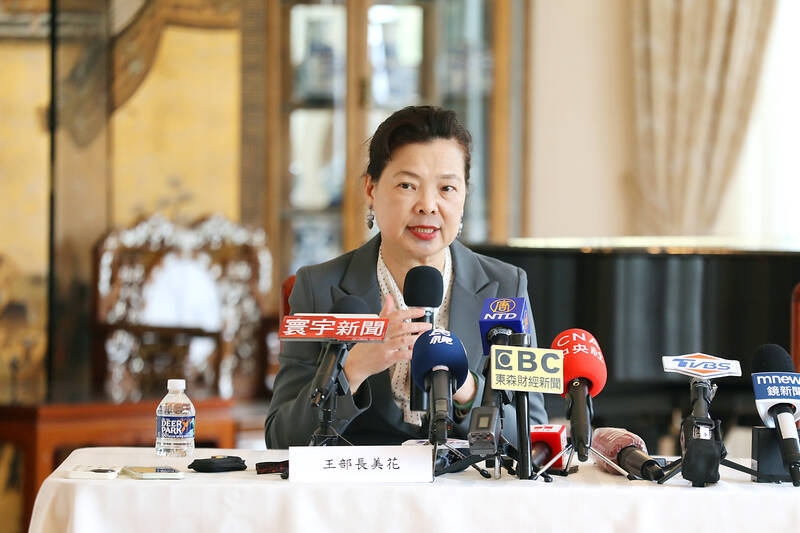Taiwanese and US companies signed seven memorandums of understanding (MOUs) at a high-level trade meeting in Washington to enhance cooperation in fields such as renewable energy and 5G communications, the Ministry of Economic Affairs said on Thursday.
The MOUs inked during the first physical meeting under the Technology Trade and Investment Collaboration (TTIC) framework could help both countries enhance cooperation and stabilize global supply chains, said Minister of Economic Affairs Wang Mei-hua (王美花), head of the Taiwanese delegation.
Participating Taiwanese companies included state-run Taiwan Power Co (Taipower, 台電), Aerospace Industrial Development Corp (AIDC, 漢翔航空), Quanta Cloud Technology (雲達科技), HTC Corp (宏達電), TMY Technology Inc (稜研科技) and Edgecore Networks Corp (鈺登), the ministry said.

Photo: CNA
On the US side, representatives from General Electric Co (GE), Intel Corp, RingCentral Inc, Lumen Technologies and DuPont were present.
One of the MOUs involves GE helping AIDC use hydrogen-based power-generation technologies to reduce greenhouse gas emissions and develop its own maintenance capabilities on a turbine-supported electrification project, the ministry said.
GE is also to work with Taipower to achieve its goal of net zero carbon emissions by 2050, the ministry said.
The MOUs also cover information and communications technology cooperation in areas such as smart manufacturing, entertainment, healthcare and 5G connectivity, it said.
Besides attending the TTIC meeting, the first since the body was established in December last year for Taiwan and the US to develop commercial programs and bolster critical technology supply chains, Wang said her trip, which runs from Oct. 9 to tomorrow, has also facilitated exchanges between about 80 Taiwanese and US firms.
Wang said the exchanges had generated a positive response, and she believed there would be more TTIC meetings next year, although the date and location were still to be decided.
Wang was to visit companies in Silicon Valley, including Applied Materials Inc, after wrapping up her visit in Washington yesterday.
She expressed hopes that her visit could generate orders and potential investments of up to NT$30 billion (US$940.91 million).
Wang reiterated Taiwan’s critical role in the global semiconductor industry, supported by a solid industry cluster, high-quality talent and a sound legal framework for semiconductor intellectual property protection.
Any disruption to the semiconductor industry in Taiwan could have a severe impact on the global tech industry and world economy, she said, calling for stable relations between Taiwan and China.

Vincent Wei led fellow Singaporean farmers around an empty Malaysian plot, laying out plans for a greenhouse and rows of leafy vegetables. What he pitched was not just space for crops, but a lifeline for growers struggling to make ends meet in a city-state with high prices and little vacant land. The future agriculture hub is part of a joint special economic zone launched last year by the two neighbors, expected to cost US$123 million and produce 10,000 tonnes of fresh produce annually. It is attracting Singaporean farmers with promises of cheaper land, labor and energy just over the border.

US actor Matthew McConaughey has filed recordings of his image and voice with US patent authorities to protect them from unauthorized usage by artificial intelligence (AI) platforms, a representative said earlier this week. Several video clips and audio recordings were registered by the commercial arm of the Just Keep Livin’ Foundation, a non-profit created by the Oscar-winning actor and his wife, Camila, according to the US Patent and Trademark Office database. Many artists are increasingly concerned about the uncontrolled use of their image via generative AI since the rollout of ChatGPT and other AI-powered tools. Several US states have adopted

A proposed billionaires’ tax in California has ignited a political uproar in Silicon Valley, with tech titans threatening to leave the state while California Governor Gavin Newsom of the Democratic Party maneuvers to defeat a levy that he fears would lead to an exodus of wealth. A technology mecca, California has more billionaires than any other US state — a few hundred, by some estimates. About half its personal income tax revenue, a financial backbone in the nearly US$350 billion budget, comes from the top 1 percent of earners. A large healthcare union is attempting to place a proposal before

KEEPING UP: The acquisition of a cleanroom in Taiwan would enable Micron to increase production in a market where demand continues to outpace supply, a Micron official said Micron Technology Inc has signed a letter of intent to buy a fabrication site in Taiwan from Powerchip Semiconductor Manufacturing Corp (力積電) for US$1.8 billion to expand its production of memory chips. Micron would take control of the P5 site in Miaoli County’s Tongluo Township (銅鑼) and plans to ramp up DRAM production in phases after the transaction closes in the second quarter, the company said in a statement on Saturday. The acquisition includes an existing 12 inch fab cleanroom of 27,871m2 and would further position Micron to address growing global demand for memory solutions, the company said. Micron expects the transaction to